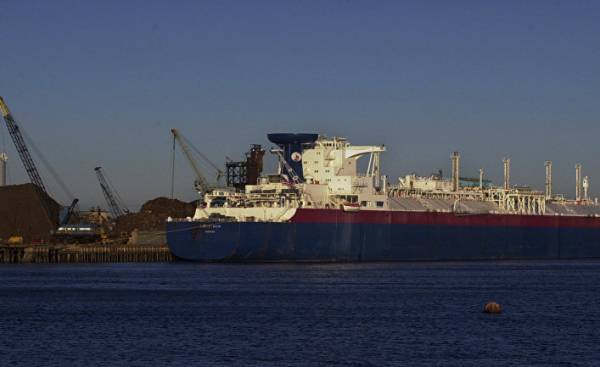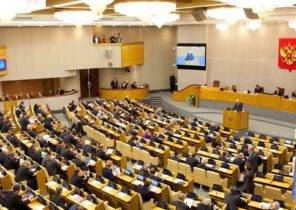
The us Senate nearly unanimously (98 votes for and 2 against) passed the law on expansion and updating of the list of sanctions against Russia. Congress has every right to make harsh statements about the alleged Russian interference in last year’s presidential election. But this bill is awaiting a vote in the house of representatives, will not provide the achievement of goals, and instead will create new problems. If the law will not be seriously revised, it will weaken the energy security of Europe and hurt the US relations with the European continent. Would benefit only Russia.
Under the threat turned out to be the common stance against Russia, which the United States and Europe adhere to as long as Moscow in 2014 annexed the Crimea. American and European partners have analyzed and evaluated all the sanctions measures prior to their adoption. Europe and the United States acted in concert, making it so that neither side took advantage of the markets and the commercial opportunities that had previously belonged to the other side. Such a transatlantic approach today was in danger because of the desire of the Senate to impose additional sanctions unilaterally without the consent and contrary to the clearly expressed will of the European Commission and key allies, including Germany, France and Italy.
Even worse than the other. The wording of the bill indicates that it is aimed at promoting the commercial interests of the United States to the detriment of Europe. In section 257 as the priority refers to “energy exports from the U.S. to create jobs.” The Europeans see this as an unfriendly political attempt of the USA to advertise the export of liquefied natural gas to Europe.
One of the targets of the bill was the pipeline “Nord stream 2” planned to strip from Russia to Germany. To participate in this project, the needs of Russian and European companies. There are a number of important arguments why Europe needs to diversify gas supplies, but the fear of dependence on the “Nord stream 2” is greatly exaggerated. Europe has taken decisive steps to strengthen security of supply. It builds additional connecting pipelines and LNG terminals, is fed by the reversal of reserves, and also removes the restrictions on destination points of delivery. Due to these measures, Russia will find it difficult to use energy as a tool of pressure on Europe.
In Europe there is a huge debate on the “Nord stream 2” and the best way forward. The parties put forward strong arguments both for and against the building. Polish and Ukrainian authorities have expressed concern about the fact that this pipeline will create competition to those pipelines through which Russian gas is pumped through their territory. Some, including German Chancellor Angela Merkel, in favor of any additional sources and routes of energy supplies to Europe, including LNG from America. Theoretically, the best course of action should be determined by the market.
This question can not be solved in Washington. This is Europe’s problem, and it should be resolved by the Europeans, based on European laws, rules and regulations. How would react USA, take Europe the law about the merits and drawbacks of the Keystone XL pipeline, especially if he was responsible solely to the interests of European business?
The Senate bill is to the detriment of Eurasian energy security and in other important respects. Perhaps the most glaring moment is that under this law, sanctions will be applied against countries where the Americans deliver the goods, services and technology for specific projects involving Russian energy firm. So, the presence of the private Russian company LUKOIL in Azerbaijan may cause the imposition of sanctions against gas field “Shah Deniz” and to prevent the gas supply from the Caspian sea to Europe through the emerging southern corridor. When encounter this threat, banks may refuse financing. And instead strengthen the security, this law will jeopardize one of the new gas alternatives to Russia, which invested $ 45 billion and which has long been implemented. Due to this provision, American companies will be forced to withdraw from the joint projects in which worldwide involve Russian firms.
Because of this law or face sanctions goods, services, technology and information that “significantly facilitate” the maintenance and servicing of pipelines, which pump Russian gas or passing through Russia. This will stop two-thirds of oil export from Kazakhstan, running along the pipes of the Caspian pipeline consortium led by Chevron, but 31% owned by the Russian state. This will complicate the operation and weaken the security of the pipelines passing through Ukraine, although it Europe gets 32% of its oil and about the same proportion of gas. For Europe, the cessation of oil and gas imports from Russia is unacceptable, because alternatives for such large amounts just yet.
Our combined experience of us-European sanctions presents two important and enduring lesson. First, sanctions are most effective when they are multilateral. Second, only the sanctions seldom achieve success in matters of national security. Theoretically, they create leverage. They almost always involve negotiations in which the sanctions regime can be adjusted as part of the strategy to achieve the desired result.
Pressure should always be accompanied by flexibility. However, the Senate bill would limit such flexibility. This unilateral approach can tip the scales in favor of those who want Europe to have refused to participate in the existing transatlantic policy towards Russia, including from the sanctions regime.
If the bill in its current form becomes law, it would alienate America its important European allies and at the critical moment will create problems in our Alliance. The best approach is to review the bill and to bring it into line with reality, and also confirm our commitment to the transatlantic exchange rate.
Wolfgang Ischinger in 2001-2006 was the German Ambassador to the United States. Since 2008 he is Chairman of the Munich security conference.







